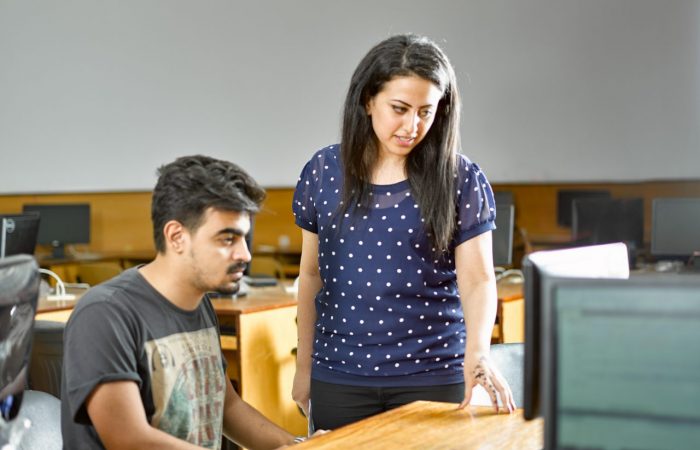The Faculty of Information Technology – Misr University for Science and Technology is based on the preparation of distinct competencies in information technology to meet the needs of the community of industry, trade and services at the local level; and the introduction of modern technologies in the educational system that enables the generation of creative craftsmanship and innovation capable of competition and entrepreneurship; and deepen the culture of information and knowledge of the environment locally through distinguished scientific research in providing solutions and applications for information technology.
Faculty of Information Technology – Misr University for Science and Technology is a pioneer in the fields of education and scientific research at the national level, keeping abreast of technological developments worldwide and contributing to the effective service of its society.
In the context of rapid technological development, especially in the field of computer science and artificial intelligence techniques, and in line with the process of digital transformation, which Misr University for Science and Technology pays great attention to. Since computer science and artificial intelligence are the most important outputs of the Fourth Industrial Revolution due to their multiple uses in all fields, it is expected to open the door to limitless innovations, as with the tremendous and accelerating technological development and the transformations the world is witnessing in light of the Fourth Industrial Revolution, computer science and artificial intelligence have become engine progress, growth, and prosperity, and it and the innovations that follow can establish a new world of machine learning and the application of its techniques in all aspects of life.
The college’s mission stems from providing distinguished education and applied scientific research based on innovation, community service, researchers and national industries in the field of computer science and artificial intelligence. The college seeks to achieve cooperation and integration and bridge the gap between industry and the university by harnessing the distinguished intellectual energy of the academic community to apply in various Egyptian industries with the latest computer science and artificial intelligence techniques, which contributes to preparing a distinguished graduate capable of competing in the global labor market in order to achieve the link between university education, community needs and production And modernizing the university’s performance through the application of automatic methods using computer science and artificial intelligence techniques to evaluate performance and ensure quality and provide innovative technological research to serve decision-makers to cover the needs of the Egyptian society, which achieves the vision of the smart university community and Egypt’s Vision 2030, which contributes to achieving the knowledge society and encouraging innovation and creativity in The framework of global competition based on excellence.
That artificial intelligence will enter all aspects of life by 2025 and will eliminate most of the possible jobs and at the same time will open the way for new job opportunities for those with the right skills, and the Markets and Markets Research Foundation has predicted that the value of the artificial intelligence market will reach 190 billion US dollars by 2025, and The International Data Corporation (IDC) expects global spending on artificial intelligence systems to reach 57.6 billion by 2021, and also predicts that 75% of commercial company and university applications will use artificial intelligence, and according to Gartner, the field of artificial intelligence will create 2.4 million jobs this year, and its report predicts. The increase in artificial intelligence will generate $2.9 billion by 2021 in business value and restore about 6.2 billion hours of worker productivity and also predicted that about 30% of business-to-business (B2B) transactions will employ artificial intelligence to speed up one of their sales processes, as the International Data Organization has proven that Spending on digital transformation will increase steadily, achieving a total annual growth rate during the five years of 16.7% during the period from 2017-2022 and that 30% of organizations will pay 10% of the annual return Noe in digital transformation.
Maximizing the use of computer science and artificial intelligence techniques by encouraging technological innovations and inventions in the fields of computer science and artificial intelligence that lead to effective community service by generating national technology to activate the contribution to coordinating university efforts to consolidate the national strategic plan in artificial intelligence to develop innovative capabilities and digital transformation and transform the university Egypt for Science and Technology for a smart university is one of the first concerns of the Artificial Intelligence Technology Center in the Faculty of Information Technology.
With my sincerest respect, appreciation, and wishes for continued success and payment,
” May Allah guide us to what he loves and it pleases Him “
Prof. Dr. Iman Karam El Sayed Mahmoud
Dean, College of Information Technology


